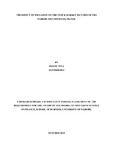| dc.description.abstract | The effect of inflation on the stock exchange and ultimately stock prices has been under scrutiny over the past few decades. The point of argument being if inflation has an impact on the volatility of stock prices and eventually the stock market. This study examined the effect of inflation on stock prices at the Nairobi Securities Exchange. Prior studies on this particular topic yielded negative correlation between the key stock exchange performance indicators and the rate of inflation. The objective of this study was to examine the effect of the inflation rate on the performance of the Kenyan Stock Market. Particular attention was paid to the effects of inflation on various stock market performance indicators, in terms of market activity and liquidity. An empirical investigation was conducted using monthly data on selected key market indicators from the NSE from the period 1998-2013 and the correlational design method of estimation applied using a regression model to test the effects of inflation on stock market returns. It was revealed that the stock market returns were positively correlated at 7.9% to the rate of inflation. This seemingly high level of influence of inflation revealed that investments can thrive well in the stock market regardless of the rate of inflation. The results seemed to agree with Fisher Hypothesis which states that an increase in the rate of inflation leads to a change in stock market returns and thus act as a good hedge against inflation. The R squared statistic measuring the ability of regression to predict the dependent variable values within the sample indicated that only 0.6% of the stock market activity can be explained by the inflation variable. This study applied GARCH to examine the effect of inflation on stock market returns. Additionally, the impact of asymmetry shocks were examined using the EGARCH model and it was established that the stock market returns at the NSE are asymmetric and thus the EGARCH model was preferred over the GARCH model. The EGARCH model captured the asymmetric effects of shocks on stock market volatility by assessing the impact of positive and negative correlations on stock market returns. The market return series was found to show evidence of asymmetric effects. From the EGARCH model, there was evidence of weak but significant support that bad news had a more adverse effect on stock market volatility as opposed to good news. Given that the Nairobi Stock Exchange has gone public, it should aim to engage the public in enlightenment on stock investment procedures and overall stock purchases to enable more investment opportunities. The government should also come up with measures and policies that will help control and stabilize the rate of inflation fluctuation so as to boost investor confidence in the securities market. This will have a significant impact on the performance of the Nairobi Securities Exchange and will ultimately uphold economic growth. | en_US |

